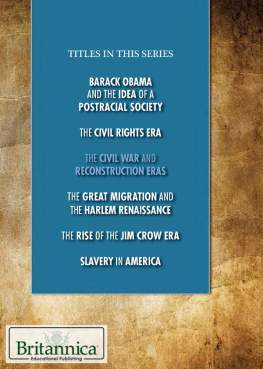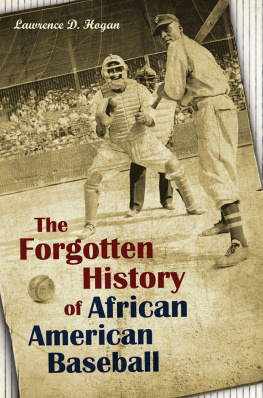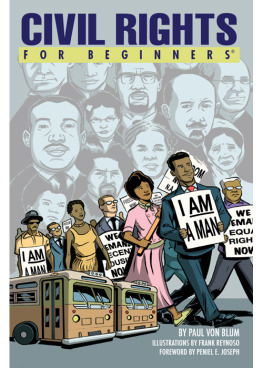A Different Day
2002 The University of North Carolina Press
All rights reserved
Manufactured in the United States of America
Designed by Nancy Ovedovitz and set in Century Expanded type by Keystone Typesetting, Inc.
The paper in this book meets the guidelines for permanence and durability of the Committee on Production Guidelines for Book Longevity of the Council on Library Resources.
Library of Congress Cataloging-in-Publication Data
De Jong, Greta.
A different day : African American struggles for justice in rural Louisiana,
19001970 / Greta de Jong.
p. cm.
Includes bibliographical references and index.
ISBN 0-8078-2711-8 (alk. paper) ISBN 0-8078-5379-8 (pbk. : alk. paper)
1. African AmericansCivil rightsLouisianaHistory20th century. 2. Civil
rights movementsLouisianaHistory20th century. 3. African American
civil rights workersLouisianaHistory20th century. 4. African Americans
LouisianaPolitics and government20th century. 5. African Americans
LouisianaSocial conditions20th century. 6. Rural populationLouisiana
History20th century. 7. LouisianaRace relations. 8. LouisianaRural
conditions. 9. LouisianaPolitics and government. I. Title.
E185.93.L6 D38 2002
323.119607307630904dc21 2001057824
cloth 06 05 04 03 02 5 4 3 2 1
paper 06 05 04 03 02 5 4 3 2 1
For mum and dad
Contents
Illustrations, Tables, and Maps
Illustrations
Children picking cotton, location unknown, n.d.
Women cutting sugarcane, Baton Rouge, April 1939
Home of a negro plantation worker, New Roads, Louisiana, October 1938
Plantation store and post office, Melrose, Louisiana, June 1940
Bar and juke joint, Melrose, Louisiana, June 1940
African American family moving, Opelousas, Louisiana, October 1938
Rosenwald school under construction, Millikens Bend, Louisiana, n.d.
Inside a plantation workers home, Melrose, Louisiana, June 1940
Civilian Conservation Corps camp, location unknown, n.d.
Adult literacy class, Louisiana, 1938
African American company of the Womens Auxiliary Army Corps, Fort Des Moines, Iowa, May 1943
Black laborers awaiting transport, Camp Livingston, Louisiana, December 1940
National defense training program, Baton Rouge, 1941
Workers on a lunch break at Higgins shipyard, New Orleans, June 1943
Cultivators with mules and drivers, Schriever, Louisiana, June 1940
Cultivating sugarcane with tractor and driver, Schriever, Louisiana, June 1940
Tables
2.1 African American Farm Operators in Louisiana, 1910 and 1930
4.1 African American Migration in Louisiana during World War I
6.1 African American Migration in Louisiana during World War II
6.2 African American Farm Operators in Louisiana, 19401960
7.1 African American Employment in Louisiana, 19401960
Maps
I.1 Parishes, Principal Cities, and Rivers of Louisiana
1.1 African American Population as a Percentage of Total Population in Louisiana Parishes, 1900
1.2 Agricultural Regions of Louisiana, 19001930
Acknowledgments
I am profoundly indebted to all of the freedom fighters who allowed me to interview them for this project: Ronnie Sigal Bouma, Harrison and Earnestine Brown, Wilbert Guillory, Clifton Hall, Eual Hall, John Henry Hall, Lawrence Hall, Lorin Hall, Eunice Hall Harris, Robert and Essie Mae Lewis, Eunice Paddio-Johnson, Meg Redden, Clarence Reed, Lola Stall-worth, Martin Williams, Moses Williams, and John Zippert. Their courage, intelligence, and insights contributed enormously to black peoples struggles for justice in Louisiana and to this book.
As with the freedom movement itself, economic factors played a significant part in shaping the possibilities and final results of my work. The Department of History and the Research and Graduate Studies Office at the Pennsylvania State University provided funding that helped me to complete much of the research for this project. Writing the first few drafts was greatly facilitated by a two-year predoctoral fellowship awarded by the Carter G. Woodson Institute for Afro-American and African Studies at the University of Virginia. The J. N. G. Finley postdoctoral fellowship at George Mason University enabled me to work on revising the manuscript for publication, and some additional funds provided by the Department of History assisted in further research. At the turn of the millennium, a visiting assistant professorship at the University of Nevada, Reno, saved me from deportation just as my visa was due to expire and I thought my world was going to end. I am very grateful for the financial support I received from all of these institutions.
I will never be able to repay my debt to the commissary of my dissertation adviser and friend, Professor Nan Elizabeth Woodruff. I thank her with all my heart for her strong encouragement, rigorous criticisms, outrageous jokes and stories, and home-cooked meals. Thanks also to the other members of my doctoral committee, Professors Gary Cross, Thavolia Glymph, Daniel Letwin, and Clyde Woods, who carefully read the initial versions of this book and offered many thoughtful suggestions for improvement. Professor Charles Payne of Duke University made time in his busy schedule to serve as a special member on my committee, and his comments and assistance were greatly appreciated.
It is hard to imagine a more supportive environment than the one I enjoyed in the Department of History at the Pennsylvania State University during my graduate years. Faculty and fellow graduate students alike warmly welcomed me into their community, making the 6,700 mile separation from my Pacific island homeland much easier to endure than it might have been. When I left Pennsylvania, I never thought I would be so fortunate againyet, incredibly, I was. Since 1997 I have relocated to a different university and a different part of the country almost every year, and every time I have found myself once more among extremely likable, generous, humorous, and inspiring colleagues. Through both formal seminars and informal conversations over coffee or lunch, their ideas and suggestions have helped to shape my thinking and contributed to the analysis presented in this book. Thank you Bill and Mary Ann Blair, Clarissa and John Confer, Gary and Eileen Gallagher, Charles (Middleton) Holden, Isabel Knight, Lynn Vacca, and Melissa Westrate at the Pennsylvania State University; Eve Agee, Reginald Butler, Lisa Lindquist Dorr, Scott French, John Gennari, Natasha Gray, Andrew Lewis, Rolland Murray, Vnia Penha-Lopes, Ian Strachan, Lisa Severson Swales, Phillip Troutman, and Robert Vinson at the Woodson Institute; Jack and Jane Censer, John Cheng, Robert DeCaroli, Matthew Karush, Alison Landsberg, Lawrence Levine, Roy Rosenzweig, Suzanne Smith, and Jeffrey Stewart at George Mason University; Scott Casper, Linda Curcio, Richard Davies, Andy Donson, Dennis Dworkin, Jerome Edwards, Frank Hartigan, Martha Hildreth, Carolyn Knapp, Bruce Moran, Elizabeth Raymond, Bill Rowley, Hugh Shapiro, Kevin Stevens, and Barbara Walker at the University of Nevada, Reno; and John Buenker, Frank Egerton, Laura Gellott, Jerry Greenfield, Oliver Hayward, and Steve Meyer at the University of Wisconsin-Parkside. Very special thanks to Mary Hebert at Louisiana State University, who assisted greatly with logistical matters during my research trips to Louisiana and who generously shared with me ideas and sources that grew out of her project on the civil rights movement in Baton Rouge.
I could not have asked for better administrative support than I received from the staffs of the universities where I worked, especially those whose jobs involved dealing with the U.S. Immigration and Naturalization Service on my behalf. In addition to answering my many questions and processing paperwork, some of them had to help me out of bureaucratic tangles more than once. If I could, I would give them all huge raises. My profound thanks to Maureen Costello, Karen Ebeling, Darla Franks, Lynn Moyer, Linda Ni-hart, Judy Shawley, and Karin Weaver at the Pennsylvania State University; Mary Farrer and Gail Shirley-Warren at the Woodson Institute; Julia Friedheim and Elizabeth Spencer at George Mason University; Debbie Hammersmith and Margaret Hellwarth at the University of Nevada, Reno; and Cheryl Gundersen and Luella Vines at the University of Wisconsin-Parkside.





